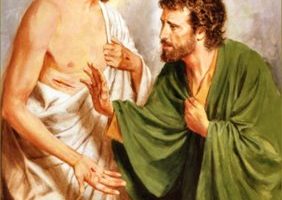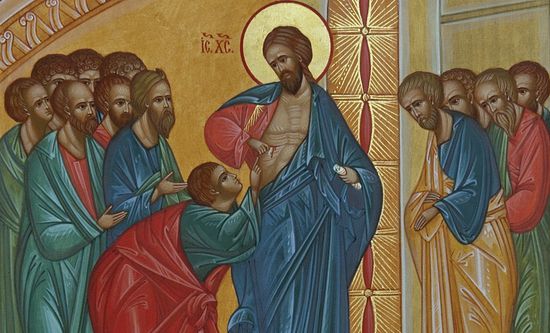 Thomas had a heart that had taken one too many beatings. Despite his often being stigmatized by later generations as “Doubting Thomas” there is nothing in his past record to indicate such a defect of character. In John’s account of Christ’s raising of Lazarus, when the Lord said that Lazarus had died and that He was going to enter the cauldron of dangerous Judea to “go to him” (John 11:15), the disciples assumed that He meant following Lazarus by dying too in His attempt to visit the grieving family. They were properly horrified, and reluctant to follow Him on such a doomed mission. It was Thomas who spurred them on and said, “Let us also go, that we may die with Him” (v. 16). In other words, Thomas could not bear the thought of letting his Lord die alone, but was prepared to accompany Him even if it meant his death as well. This is not the utterance of a doubter, or of someone who is of two minds. Thomas had wrapped his whole life around Jesus, and that life would have no meaning without Him.
Thomas had a heart that had taken one too many beatings. Despite his often being stigmatized by later generations as “Doubting Thomas” there is nothing in his past record to indicate such a defect of character. In John’s account of Christ’s raising of Lazarus, when the Lord said that Lazarus had died and that He was going to enter the cauldron of dangerous Judea to “go to him” (John 11:15), the disciples assumed that He meant following Lazarus by dying too in His attempt to visit the grieving family. They were properly horrified, and reluctant to follow Him on such a doomed mission. It was Thomas who spurred them on and said, “Let us also go, that we may die with Him” (v. 16). In other words, Thomas could not bear the thought of letting his Lord die alone, but was prepared to accompany Him even if it meant his death as well. This is not the utterance of a doubter, or of someone who is of two minds. Thomas had wrapped his whole life around Jesus, and that life would have no meaning without Him.
Like the other disciples, Thomas rode the rollercoaster of His Lord’s final days. He rode to the dizzying top when they entered Jerusalem and found the road strewn with palms and the air rent with cries of acclamation. He shared their sense of imminent triumph when Jesus commandeered the Temple and brought to public humiliation those who tried to entrap Him there. And like the other disciples he rode to the bottom of despair and grief when the morning after His late night Paschal arrest the mid-morning sun saw Him hanging on a cross. One can only imagine the trauma to his poor tender heart—the heart of someone who was prepared to die with his Lord during His recent visit to Lazarus in Bethany. They were so sure that Jesus was the Messiah, and that His Kingdom was at hand. Yet His crucifixion at Roman hands was the indisputable proof, as far as a Jewish mind was concerned, that He could not have been the Messiah, for the Messiah was by definition the conquering King, the one who would triumph over the Romans. Thomas’ whole world had been turned upside down in a day. How could they all have been so wrong? He could scarcely bear to try to work it out: had the Pharisees been right after all when they said He was a blasphemer who worked miracles by the power of Satan?
Then came the offer of another ride to the top of the rollercoaster: his fellow disciples came and said that He was alive after all and that they had seen Him (John 20:25). Thomas could not bear yet another disappointment, another blow to his heart. He could not bear to have his hopes ignited only to be told by them in another day or so that they had been mistaken after all, and that it was a mass hallucination or that it was only someone who looked like Jesus. Thomas faced them all and drew his line in the epistemological sand: “Unless I shall see in His hands the imprint of the nails and put my finger into the place of the nails, and put my hand into His side, I will not believe!” They could believe all they liked; he would await the proof from his own senses. Note that Thomas did not say, “I cannot believe”, but “I will not believe”—this was about decision. Thomas was not doubting so much as choosing—making the choice to withhold belief until he had seen it for himself. It was not a defect in character, but the putting on of armour, and his only way of protecting himself from yet another wound to his already bleeding heart.
And yet, note the next verse of John’s Gospel: “After eight days again His disciples were inside and Thomas with them”. Despite his refusal to share their faith, Thomas did not leave the apostolic company. In the months and years they had known Jesus, He had melded them into a unified family. They came from wildly disparate backgrounds—Simon was a Zealot who was dedicated to the violent overthrow of Rome, and Matthew was a collaborator who collected taxes for Rome. And yet Jesus had transformed them, so that they were now dedicated not only to Him but also to one another—and Thomas remained with this family. That was why he was with them a week later when Jesus once again came into their midst. That was why Jesus was able to reveal Himself to Thomas and elicit from him the saving cry, “My Lord and my God!” There is no reason to think that Jesus would have tracked him down if he had abandoned his fellow apostles and renounced their company. The risen Christ only revealed Himself to those who loved Him and identified themselves with His other disciples. He did not reveal Himself to Pilate and throw back into his Roman teeth the cynical quip, “What is truth?” He did not reveal Himself to Caiaphas to reassert His Messianic claim to now sit at the right hand of Power. His revelation to Thomas happened because Thomas stayed with his apostolic family and did not leave their company.
In doing this, Thomas teaches us also. We also sometimes are subject to doubts about the truth of the Christian faith. Thomas’ doubt sprung from a heart that had been struck down by sudden trauma. Ours springs from the slow, ceaseless, and unrelenting barrage of propaganda from our secular society that inundates us. We in the modern West live in a world washed clean from any trace of God or faith. Everything our senses encounter reinforces the lie—every book or magazine we open, every movie, television programme or newscast we watch, every casual contact or radio announcer we hear. After a while we grow tired of fighting. Can the whole world be wrong and we Christians alone be right? A kind of spiritual fatigue overtakes us and the secular model of reality begins to look ever more tempting; unbelief, moral and religious relativism gain ever more credibility. What do we do then? Where can we take our doubts?
Thomas teaches us: take your doubts to Church. Do not abandon your Christian family, or retreat from the apostolic company. Stay in Church, praying privately and attending the Church’s public Liturgy. And ask Christ to give you the answers, and reveal Himself, and bring you the truth. If you really want to know the truth, Christ will give it to you. But be clear: you must want to find the truth like a starving man wants to find food, like a man dying of thirst in the desert wants to find a watery oasis. If you merely wouldn’t mind knowing the truth, there is no reason to think you will hear from Christ, for you are trifling with God. God Himself promised: “You will seek Me and find Me when you search for Me with all your heart” (Jeremiah 29:13). If you really want the truth, Christ will reveal it to you, for everyone who seeks finds. St. Thomas is not just the saint for Christian doubters. He is the saint for all souls who really want to know the truth. And he reveals where that truth can be found: in the apostolic Church of the living God.

















